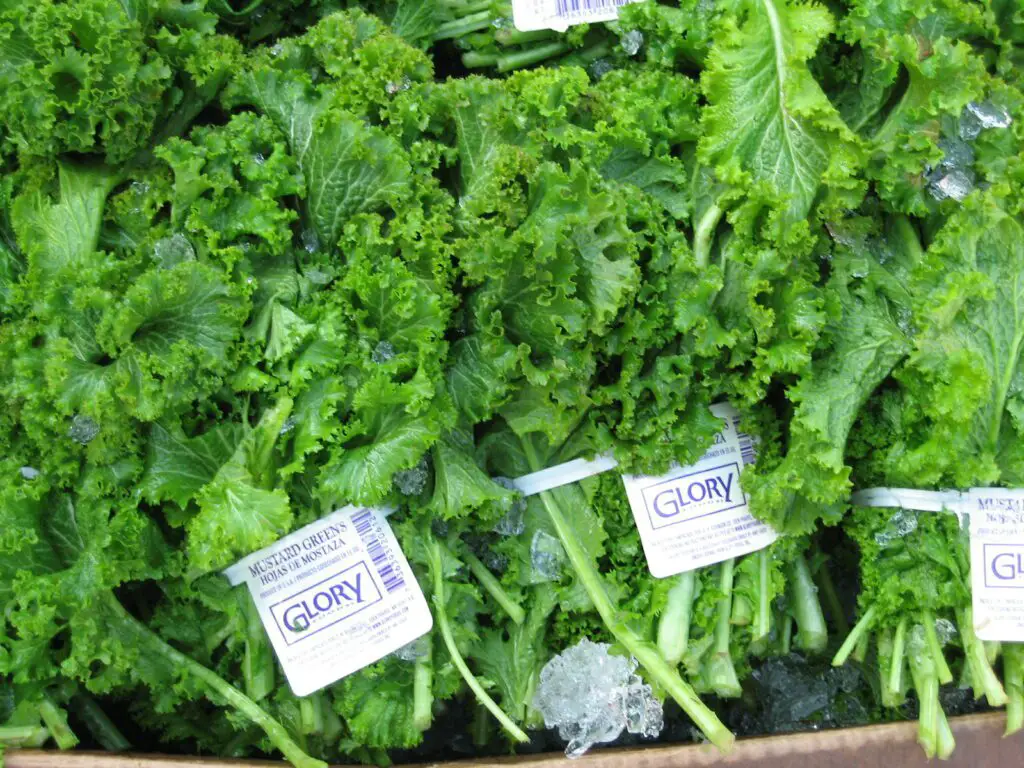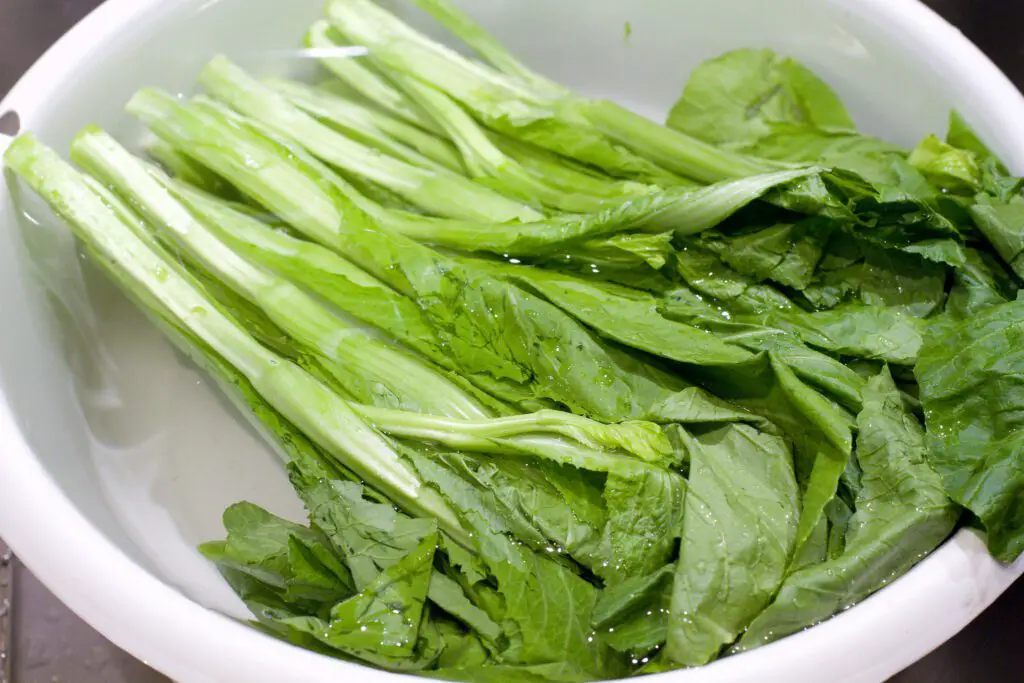If you’re a dog owner who loves to add some variety to your furry friend’s diet, you may have wondered whether mustard greens are safe for dogs to eat.
Mustard greens are known for their nutritional value, packed with vitamins A, C, and K, as well as antioxidants and fiber.
However, not all human foods are safe for dogs, so it’s essential to do your research before introducing new ingredients into their meals.
In this article, we’ll explore whether dogs can eat mustard greens and what benefits they can offer to your pup’s overall health.
So, let’s delve into the cruciferous world of mustard greens and their potential impact on your dog’s diet!
- Can Dogs Eat Mustard Greens?
- How Many Mustard Greens Can Dogs Eat?
- How Often Can Dogs Eat Mustard Greens
- Health Benefits of Mustard Greens To Dogs
- Potential Risks of Feeding Mustard Greens To Dogs
- Nutritional Benefits of Mustard Greens For Dogs
- Are Dogs Sensitive To Mustard Greens?
- How To Prepare Mustard Greens For Dogs
- How Fast Will Dogs Digest Mustard Greens?
- In Conclusion
Can Dogs Eat Mustard Greens?

Yes, dogs can eat raw and cooked mustard greens without the stems in moderation.
Mustard greens are an excellent source of vitamins, minerals, and antioxidants that provide numerous health benefits for dogs.
They offer high levels of vitamin A, which promotes healthy vision, and vitamin K which promotes healthy blood clotting.
Mustard greens also contain fiber that aids digestion and supports overall gastrointestinal health.
However, it is essential to prepare mustard greens adequately before feeding them to your dog and ensure moderation to avoid any digestive upset issues.
In the following sections, we’ll explore the benefits and risks of feeding your dog mustard greens and how to incorporate them into your dog’s diet safely.
See also: 47 Safe Vegetables To Feed Your Dog. Puppy Power!
How Many Mustard Greens Can Dogs Eat?

While mustard greens can provide several health benefits to dogs, it’s essential to limit their intake in moderation.
Too many mustard greens can cause digestive upset, such as stomach pain, diarrhea, or gas.
As a rule of thumb, dogs should consume no more than ten percent of their daily food intake in vegetables, including mustard greens.
For example, if your dog eats two cups of food each day, they should not consume more than two tablespoons of mustard greens.
It’s always best to consult with your vet to determine the right balance of vegetables that meets the unique nutritional needs of your dog.
Mustard Greens Feeding Chart According To Size
| Food | Size | Portion |
|---|---|---|
| Mustard Greens | Toy dogs | 1 tbsp |
| Mustard Greens | Small dogs | 1 tbsp |
| Mustard Greens | Medium dogs | 2 tbsps |
| Mustard Greens | Large Dogs | 2 tbsps |
Mustard Greens Feeding Chart According To Age
| Food | Age | Portion |
|---|---|---|
| Mustard Greens | 0 – 6 months | Don’t feed |
| Mustard Greens | 6 – 12 months | 1 tbsp |
| Mustard Greens | 12 – 24 months | 2 tbsps |
| Mustard Greens | 24+ months | 2 tbsps |
How Often Can Dogs Eat Mustard Greens
As with any new food, it’s always best to introduce mustard greens gradually into your dog’s diet to monitor their response.
Once your dog has adapted to the new food, they can enjoy mustard greens as a regular part of their diet.
However, it’s essential to maintain moderation in feeding your dog mustard greens to avoid any digestive upset.
It’s recommended to feed your dog mustard greens once or twice per week, alternating with other vegetables to provide a balanced and varied diet.
Again, it’s always best to consult with your vet to determine the appropriate amount of vegetables for your dog.
Health Benefits of Mustard Greens To Dogs
- Rich in Antioxidants. Mustard greens are packed with antioxidants that help boost the immune system, fight disease, and aid overall health.
- High in Vitamins. Mustard greens contain high levels of vitamin A which promotes healthy vision, as well as vitamin K, which promotes healthy blood clotting, a critical function for your dog’s health.
- Good for Digestion. The fiber present in mustard greens aids digestion and can help with constipation or diarrhea by promoting regular bowel movements.
- Low in Calories. Mustard greens are low in calories compared to other dog foods and can help maintain your dog’s ideal weight when used as occasional supplements.
- Anti-Inflammatory Properties. Mustard greens contain anti-inflammatory properties that can help ease joint pain and stiffness associated with arthritis, a common issue in aging dogs.
- Helps Detoxify. Mustard greens contain compounds that help in detoxifying the liver and blood, aiding in promoting overall health.
- Can Improve Skin and Coat. The vitamin A in mustard greens can help improve skin and coat health and promote a shiny, healthy fur coat.
Potential Risks of Feeding Mustard Greens To Dogs
- Can Cause Digestive Upset. Mustard greens are high in fiber, which can cause digestive upset, including stomach pain, bloating, diarrhea, or constipation, especially when introduced abruptly.
- Can Interfere With Medication. Mustard greens contain vitamin K, which can interfere with blood-thinning medication such as warfarin. Consult with your veterinarian before introducing mustard greens to your dog.
- Toxicity Concerns. Some dogs may be allergic to mustard greens, and like all cruciferous vegetables, they contain compounds that can interfere with thyroid function, leading to an underactive thyroid gland in large amounts.
- Oxalate Concerns. Mustard greens contain oxalates, which can contribute to the formation of kidney stones in dogs prone to that kind of health concern.
- Overfeeding Can Cause Weight Gain. While mustard greens are low in calories compared to other dog foods, overfeeding can cause weight gain that can lead to obesity and potential health issues.
Nutritional Benefits of Mustard Greens For Dogs
| Mustard Greens Nutrition Facts per 100 grams | % DV * |
|---|---|
| Calories | 27 |
| Total Fat | 0.4 g |
| Cholesterol | 0 mg |
| Sugar | 1.3 g |
| Glycemic Index | 2 |
| Sodium | 20 mg |
| Carbs | 4.7 g |
| Protein | 2.9 g |
| Vitamin C | 16% |
| Calcium | 11% |
| Iron | 8% |
| Potassium | 384 mg |
Are Dogs Sensitive To Mustard Greens?
While some dogs can safely eat mustard greens, others may be sensitive to them, and it’s essential to watch out for symptoms of intolerance.
Common symptoms of mustard greens sensitivity or intolerance can include gastrointestinal issues like vomiting, diarrhea, gas, bloating, and abdominal discomfort.
Other signs may include skin irritation or itchiness, hives, or swelling.
If your dog exhibits any of these symptoms after eating mustard greens, it’s best to avoid feeding them to your dog in the future and seek veterinary advice if symptoms persist or worsen.
How To Prepare Mustard Greens For Dogs
Wash and chop
Rinse the mustard greens thoroughly to remove any dirt or debris. Chop them into small pieces and mix them into your dog’s food. Make sure to remove the stems, as they can be tough to digest.
Blanch and freeze
Another way to prepare mustard greens for your dog is by blanching them. Blanching involves boiling the mustard greens for a few minutes and then immediately removing them from the heat and placing them in ice water to stop the cooking process. Once cooled, chop the greens and freeze them in small portions for later use.
Steaming
Steaming the mustard greens is another way to prepare them for your dog. Steam the greens until they are tender, then chop them and mix them into your dog’s food. This method retains more nutrients than boiling, making it a healthier option for your dog.
How Fast Will Dogs Digest Mustard Greens?
The exact digestion time for mustard greens in dogs can vary depending on the dog’s overall health, age, size, activity level, and the amount of mustard greens they have eaten.
However, like most green vegetables, mustard greens are high in fiber, which takes longer to digest than many other dog foods.
As a result, it can take about 12-24 hours for dogs to digest mustard greens fully. Some dogs may take longer than others, especially if they have an underlying digestive issue.
Therefore, it’s crucial to monitor your dog closely for any signs of digestive upset after feeding them mustard greens.
If you notice that your dog has any digestive issues, it is best to reduce the amount or exclude mustard greens from their diet altogether.
In Conclusion
In conclusion, dogs can eat mustard greens in moderation as long as they are adequately prepared and introduced gradually into their diet.
Mustard greens provide high levels of vitamins, antioxidants, and fiber, which can offer some health benefits to dogs, including digestion, immune system, joint health, and skin and coat health.
However, there are some potential risks associated with feeding mustard greens to dogs, such as digestive upset, medication interference, toxicity concerns, oxalate concerns, and weight gain.
As with any food, it’s essential to monitor your dog’s reaction after introducing mustard greens into their diet carefully.
Always consult with your veterinarian about your dog’s nutritional needs and any underlying health issues before introducing any new foods to their diet.





Leave a Reply